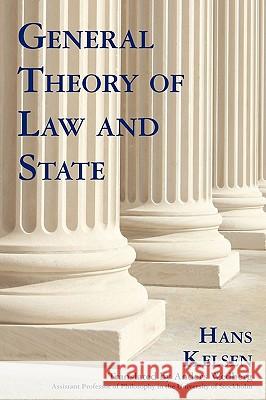General Theory of Law and State » książka
General Theory of Law and State
ISBN-13: 9781584777175 / Angielski / Miękka / 2009 / 544 str.
General Theory of Law and State
ISBN-13: 9781584777175 / Angielski / Miękka / 2009 / 544 str.
(netto: 239,82 VAT: 5%)
Najniższa cena z 30 dni: 249,03
ok. 16-18 dni roboczych.
Darmowa dostawa!
Reprint of the first edition. This classic work by the important Austrian jurist is the fullest exposition of his enormously influential pure theory of law, which includes a theory of the state. It also has an extensive appendix that discusses the pure theory in comparison with the law of nature, positivism, historical natural law, metaphysical dualism and scientific-critical philosophy. "The scope of the work is truly universal. It never loses itself in vague generalities or in unconnected fragments of thought. On the contrary, precision in the formulation of details and rigorous system are characteristic features of the exposition: only a mind fully concentrated upon that logical structure can possibly follow Kelsen's penetrating analysis. Such a mind will not shrink from the effort necessary for acquainting itself with...the pure theory of law in its more general aspects, and will then pass over to the theory of the state which ends up with a carefully worked out theory of international law." Julius Kraft, American Journal of International Law 40 (1946):496.
Reprint of the first edition. This classic work by the importantAustrian jurist is the fullest exposition of his enormouslyinfluential pure theory of law, which includes a theory of the state.It also has an extensive appendix that discusses the pure theory incomparison with the law of nature, positivism, historical natural law,metaphysical dualism and scientific-critical philosophy. "The scope ofthe work is truly universal. It never loses itself in vaguegeneralities or in unconnected fragments of thought. On the contrary,precision in the formulation of details and rigorous system arecharacteristic features of the exposition: only a mind fullyconcentrated upon that logical structure can possibly follow Kelsenspenetrating analysis. Such a mind will not shrink from the effortnecessary for acquainting itself with...the pure theory of law in itsmore general aspects, and will then pass over to the theory of thestate which ends up with a carefully worked out theory ofinternational law.": Julius Kraft, American Journal of InternationalLaw 40 (1946):496.











